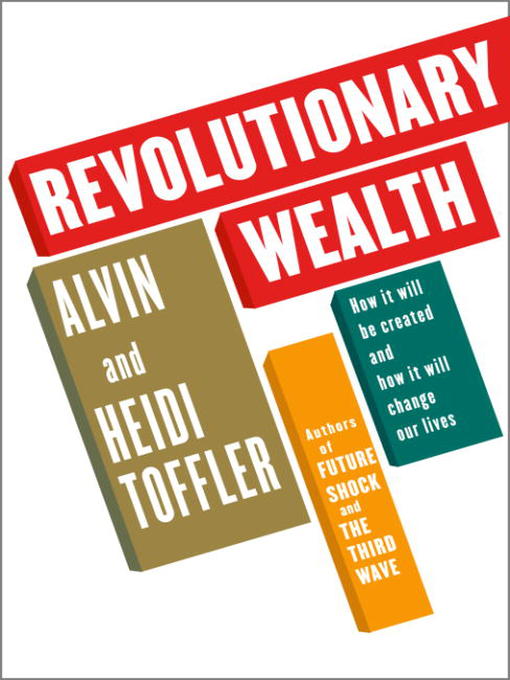
Revolutionary Wealth
How It Will Be Created and How It Will Change Our Lives
کتاب های مرتبط
- اطلاعات
- نقد و بررسی
- دیدگاه کاربران
نقد و بررسی

March 27, 2006
This latest futurist forecast by the Tofflers, the husband-and-wife authors of Future Shock
, anxiously surveys hundreds of technological, economic and social developments, including globalization, the rise of China, the decay of Europe, the decline of nuclear families, kids today, satellites, genetic engineering, alternative energy sources, frequent-flyer miles, the Internet and the rise of a new economic group, "prosumers" (those who create goods and services "for own use or satisfaction, rather than for sale or exchange"). Above all, the authors note the ever-accelerating speed and transience of all things such that nanoseconds are now too slow and will be replaced by even zippier "zeptoseconds." The Tofflers try, none too incisively, to order the chaos by invoking the "deep fundamentals" of time, space and the cutting-edge "knowledge economy" that is fast outdistancing obsolete industrial-era government institutions. The Tofflers' mantra of "revolutionary wealth" implies that there's money to be made from the maelstrom, but their specific prognostications—the "explosion" of a nonmonetary "prosumer" economy of family care, hobbies and volunteerism; embedded "pinky chips" combining ID and credit cards; the comeback of barter—seem underwhelming or unlikely. 200,000 first printing

Starred review from May 15, 2006
Alvin Toffler ("Future Shock"; "The Third Wave") and Heidi Toffler (coauthor, with her husband, "Creating a New Civilization: The Politics of the Third Wave") have once again peered into the future. The subject is how a knowledge-based economy (i.e., an economy based on brain power rather than physical labor) will help create new wealth in the future. Confronting a Toffler book is like embarking on a good detective story: many pieces of evidence are examined, discarded, and reexamined, until finally all is revealed. The book revisits ground covered in the authors' earlier works, notably their theories of how -prosumers - (a new breed of producers who are also consumers) will become even more prevalent. While building a convincing case that the acquisition of new knowledge will benefit these prosumers as well as others, they pay less attention to what might happen if the newly created knowledge is either misunderstood or badly utilized. Though the authors may seem overly pessimistic at times, the overall thrust of their book is optimistic. This is not an easy book to read, as it visits so many disparate topics (among them energy, education, and globalization), making it hard at times to connect all the dots. But the patient reader can learn much from the Tofflers' new paradigm, which suggests how using newly created knowledge might create revolutionary wealth and dramatically transform the world. Brilliant, incisive, and seminal, this book will be talked about for years to come. Highly recommended. [See Prepub Alert, "LJ" 12/05.]" -Richard Drezen, Washington Post News Research, NY"
Copyright 2006 Library Journal, LLC Used with permission.

March 15, 2006
Toffler's 1970 book " Future Shock" was a warning shot across the bow, predicting how our adjustment to the rapid acceleration of technological change in the new "super-industrial society" would cause disorientation and dysfunction in the general population. Although facets of the mass disintegration Toffler predicted have come to pass, much of society has come to embrace technology in ways Toffler couldn't have imagined 36 years ago. In the interim, Toffler has continued his futurist prognostications, most notably with " The Third Wave" (1984) and " Power Shift" (1991). With his wife Heidi, Toffler continues his series of scholarly commentary on social and economic change with a look at the revolutionary ways that wealth will be created in the future. The Tofflers' main theme is " prosumerism," a trend whereby the division between the creator and consumer of goods and services blurs. Companies are quietly shunting much of their labor costs off onto the consumer: using ATMs or going online instead of seeing a bank teller and using self-checkout at the grocery store. The computer has opened up avenues of wealth creation that shatter the concept of the "job" as a relationship between employer and employee. Toffler's pessimism has certainly tempered in the years since " Future Shock"; this time the authors take a historical perspective and wax philosophical on this little slice in time we call the twenty-first century.(Reprinted with permission of Booklist, copyright 2006, American Library Association.)

























دیدگاه کاربران